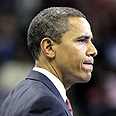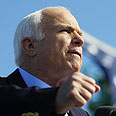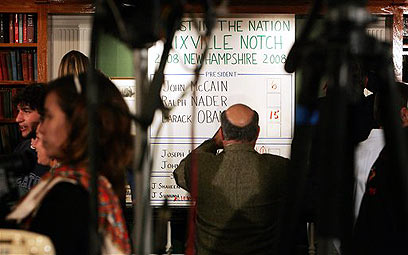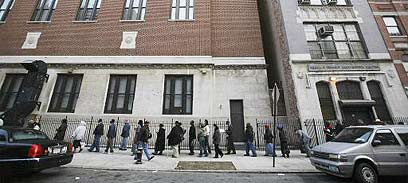

The marathon political campaign, which traditionally winds down in the days before the election, continued through Election Day as the two candidates campaigned through the final hours with get-out-the-vote efforts expected to result in a record turnout.
Obama planned a campaign stop in Indiana on Election Day before a massive outdoor rally in his adopted hometown of Chicago. McCain was headed to events Tuesday in Colorado and New Mexico, then a party in Phoenix.
Obama, who is seeking to become the first black US president, led in the national polls and sounded confident in the closing hours of the race.
"I'm feeling kind of fired up. I'm feeling like I'm ready to go," Obama told nearly 100,000 people gathered for his final rally Monday night in Virginia, a state that has not voted for a Democratic presidential nominee in 44 years.
"At this defining moment in history, Virginia, you can give this country the change it needs," he said.
Obama planned a campaign stop in Indiana on Election Day before a massive outdoor rally in his adopted hometown of Chicago. McCain was headed to events Tuesday in Colorado and New Mexico, then a party in Phoenix.
Obama, who is seeking to become the first black US president, led in the national polls and sounded confident in the closing hours of the race.
"I'm feeling kind of fired up. I'm feeling like I'm ready to go," Obama told nearly 100,000 people gathered for his final rally Monday night in Virginia, a state that has not voted for a Democratic presidential nominee in 44 years.
"At this defining moment in history, Virginia, you can give this country the change it needs," he said.

Dixville Notch election results (Photo: AP)
McCain, meanwhile, said while he understands he is the underdog, his longshot bid for the presidency is close to victory.
"I think these battleground states have now closed up, almost all of them, and I believe there's a good scenario where we can win," McCain told CBS' television's "The Early Show."
"You can't imagine, you can't imagine the excitement of an individual to be this close to the most important position in the world, and I'll enjoy it, enjoy it," he said. "I'll never forget it as long as I live."
The Republican appeared early Tuesday morning at a home-state rally in Prescott, Arizona.
The race generated so much enthusiasm that voters in Virginia and New York lined up outside polling places hours before they opened at 6 am (1100 GMT).
About 29 million people have already cast ballots over the past few weeks in 30 states that allow early voting.
Some experts said Obama has built a grass-roots organization that could drive a massive Democratic turnout and transform victory into a rout.
But the Democrat on Monday warned his supporters to take nothing for granted, as the race depended on a relative handful of states that could go for either candidate.
"Even if it rains tomorrow, you can't let that stop you. You've got to wait in line. You've got to vote," he said.
Obama won the first Election Day contest, in two small New Hampshire towns where voters traditionally cast ballots shortly after midnight.
Obama defeated McCain by a 15-6 vote in Dixville Notch, while voters in the town of Hart's Location cast 17 votes for Obama, 10 for McCain and two for write-in Ron Paul. President George W. Bush carried both towns in the last two elections.
Both Obama, a 47-year-old first term senator from Illinois, and McCain, a 72-year-old veteran senator from Arizona, pledged to bring sweeping change to Washington and close the door on the two-term presidency of Bush _ whose approval ratings are near historic lows.
But the two candidates were divided by age, race and core political convictions. They were deeply at odds over how to fix the US's crumbling economy and end the 5 1/2-year war in Iraq.
Obama seemed to hold the edge with early voters, as officials reported that more Democrats than Republicans had cast ballots in North Carolina, Colorado, Florida and Iowa. All four states voted for Bush in 2004.
Democrats also sought to gain seats in both chambers of Congress, while Republicans battled to limit their losses. Many races were rated as tossups in the campaign's final hours.
In the closing hours of Obama's campaign, he mourned the loss of his grandmother, Madelyn Payne Dunham, 86, who died of cancer in Hawaii late Sunday. Dunham raised Obama during much of his childhood, but she never got to see the results of the historic election.
"She's gone home," Obama said, tears running down both cheeks as tens of thousands of rowdy supporters at the University of North Carolina-Charlotte grew silent. The family said a private ceremony would be held later.
Bush out of sight
McCain on Monday made a frantic and grueling dash through several traditionally Republican states where his chances were uncertain.
He stopped in Florida, Virginia, Indiana, New Mexico and Nevada. And he again passed through Pennsylvania, a state that voted Democratic in 2004 and where he trails by a wide margin in some polls.
The veteran Arizona senator sought to paint Obama a a political radical, far outside the American mainstream. "Sen. Obama is in the far left lane," he said.
A Republican group, meanwhile, repeatedly aired television ads attacking Obama for his association with a black preacher whose has harshly criticized the US in fiery sermons.
During the campaign, McCain sought to distance himself from the Bush, stressing his differences with the Republican incumbent's economic policies while promising to clean house in the US capital after years of scandal.
But Obama, campaigning on a message of change, appeared to have the edge with voters seeking political reform, taking the lead in the race after the nation's faltering economy eclipsed the war in Iraq as voters' major concern.
He also has benefited from a record fundraising effort and capitalized on a US demographic shift as more young and non-white voters enter the electorate.
A USA Today/Gallup poll published Monday found likely voters nationwide favoring Obama by 11 points over McCain, 53-42 percent, with a margin of error of 2 percentage points. Other polls showed Obama with a 7 or 8 percentage-point lead.
The American presidential election amounts to separate contests in 50 states and Washington, DC.
At stake are 538 electors, with the winning candidate needing to capture at least half plus one. Electors are apportioned to the states roughly according to population.

Voters outside polling station in Harlem, New York (Photo: Reuters)
As Election Day dawned, Obama was favored to win all the states Democrats captured in 2004. That would give him 251 electoral votes.
Victories in a few swing states could give him 270 electoral votes and the presidency.
McCain, meanwhile, must hold as many Bush states as possible while trying to capture a Democratic stronghold, such as Pennsylvania in order to keep his hopes alive.
McCain's running mate, Alaska Governor Sarah Palin, on Monday raced through five states – Ohio, Missouri, Iowa, Colorado and Nevada – in an effort to boost conservative turnout for McCain.
Delaware Sen. Joe Biden, Obama's running mate, campaigned in Missouri, Ohio and held a late night rally in Pennsylvania.















